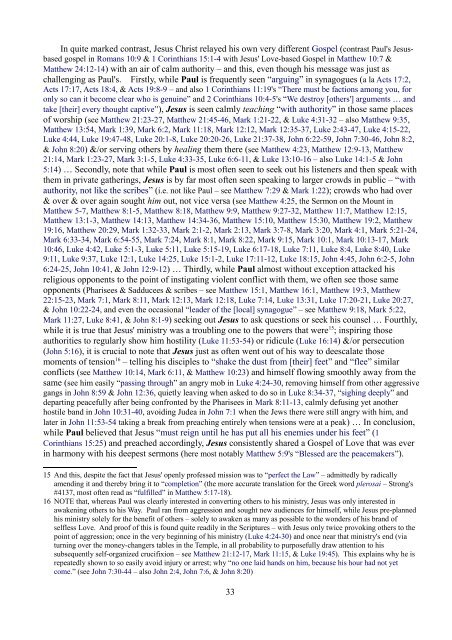The Cult of Paul
an exhaustive biblical examination of the starkly contrasting lives, values, & theologies of Jesus Christ and Paul -- Jesus' most zealous “apostle,” and the true father of the modern-day Christian church
an exhaustive biblical examination of the starkly contrasting lives, values, & theologies of Jesus Christ and Paul -- Jesus' most zealous “apostle,” and the true father of the modern-day Christian church
Create successful ePaper yourself
Turn your PDF publications into a flip-book with our unique Google optimized e-Paper software.
In quite marked contrast, Jesus Christ relayed his own very different Gospel (contrast <strong>Paul</strong>'s Jesusbased<br />
gospel in Romans 10:9 & 1 Corinthians 15:1-4 with Jesus' Love-based Gospel in Matthew 10:7 &<br />
Matthew 24:12-14) with an air <strong>of</strong> calm authority – and this, even though his message was just as<br />
challenging as <strong>Paul</strong>'s. Firstly, while <strong>Paul</strong> is frequently seen “arguing” in synagogues (a la Acts 17:2,<br />
Acts 17:17, Acts 18:4, & Acts 19:8-9 – and also 1 Corinthians 11:19's “<strong>The</strong>re must be factions among you, for<br />
only so can it become clear who is genuine” and 2 Corinthians 10:4-5's “We destroy [others'] arguments … and<br />
take [their] every thought captive”), Jesus is seen calmly teaching “with authority” in those same places<br />
<strong>of</strong> worship (see Matthew 21:23-27, Matthew 21:45-46, Mark 1:21-22, & Luke 4:31-32 – also Matthew 9:35,<br />
Matthew 13:54, Mark 1:39, Mark 6:2, Mark 11:18, Mark 12:12, Mark 12:35-37, Luke 2:43-47, Luke 4:15-22,<br />
Luke 4:44, Luke 19:47-48, Luke 20:1-8, Luke 20:20-26, Luke 21:37-38, John 6:22-59, John 7:30-46, John 8:2,<br />
& John 8:20) &/or serving others by healing them there (see Matthew 4:23, Matthew 12:9-13, Matthew<br />
21:14, Mark 1:23-27, Mark 3:1-5, Luke 4:33-35, Luke 6:6-11, & Luke 13:10-16 – also Luke 14:1-5 & John<br />
5:14) … Secondly, note that while <strong>Paul</strong> is most <strong>of</strong>ten seen to seek out his listeners and then speak with<br />
them in private gatherings, Jesus is by far most <strong>of</strong>ten seen speaking to larger crowds in public – “with<br />
authority, not like the scribes” (i.e. not like <strong>Paul</strong> – see Matthew 7:29 & Mark 1:22); crowds who had over<br />
& over & over again sought him out, not vice versa (see Matthew 4:25, the Sermon on the Mount in<br />
Matthew 5-7, Matthew 8:1-5, Matthew 8:18, Matthew 9:9, Matthew 9:27-32, Matthew 11:7, Matthew 12:15,<br />
Matthew 13:1-3, Matthew 14:13, Matthew 14:34-36, Matthew 15:10, Matthew 15:30, Matthew 19:2, Matthew<br />
19:16, Matthew 20:29, Mark 1:32-33, Mark 2:1-2, Mark 2:13, Mark 3:7-8, Mark 3:20, Mark 4:1, Mark 5:21-24,<br />
Mark 6:33-34, Mark 6:54-55, Mark 7:24, Mark 8:1, Mark 8:22, Mark 9:15, Mark 10:1, Mark 10:13-17, Mark<br />
10:46, Luke 4:42, Luke 5:1-3, Luke 5:11, Luke 5:15-19, Luke 6:17-18, Luke 7:11, Luke 8:4, Luke 8:40, Luke<br />
9:11, Luke 9:37, Luke 12:1, Luke 14:25, Luke 15:1-2, Luke 17:11-12, Luke 18:15, John 4:45, John 6:2-5, John<br />
6:24-25, John 10:41, & John 12:9-12) … Thirdly, while <strong>Paul</strong> almost without exception attacked his<br />
religious opponents to the point <strong>of</strong> instigating violent conflict with them, we <strong>of</strong>ten see those same<br />
opponents (Pharisees & Sadducees & scribes – see Matthew 15:1, Matthew 16:1, Matthew 19:3, Matthew<br />
22:15-23, Mark 7:1, Mark 8:11, Mark 12:13, Mark 12:18, Luke 7:14, Luke 13:31, Luke 17:20-21, Luke 20:27,<br />
& John 10:22-24, and even the occasional “leader <strong>of</strong> the [local] synagogue” – see Matthew 9:18, Mark 5:22,<br />
Mark 11:27, Luke 8:41, & John 8:1-9) seeking out Jesus to ask questions or seek his counsel … Fourthly,<br />
while it is true that Jesus' ministry was a troubling one to the powers that were 15 ; inspiring those<br />
authorities to regularly show him hostility (Luke 11:53-54) or ridicule (Luke 16:14) &/or persecution<br />
(John 5:16), it is crucial to note that Jesus just as <strong>of</strong>ten went out <strong>of</strong> his way to deescalate those<br />
moments <strong>of</strong> tension 16 – telling his disciples to “shake the dust from [their] feet” and “flee” similar<br />
conflicts (see Matthew 10:14, Mark 6:11, & Matthew 10:23) and himself flowing smoothly away from the<br />
same (see him easily “passing through” an angry mob in Luke 4:24-30, removing himself from other aggressive<br />
gangs in John 8:59 & John 12:36, quietly leaving when asked to do so in Luke 8:34-37, “sighing deeply” and<br />
departing peacefully after being confronted by the Pharisees in Mark 8:11-13, calmly defusing yet another<br />
hostile band in John 10:31-40, avoiding Judea in John 7:1 when the Jews there were still angry with him, and<br />
later in John 11:53-54 taking a break from preaching entirely when tensions were at a peak) … In conclusion,<br />
while <strong>Paul</strong> believed that Jesus “must reign until he has put all his enemies under his feet” (1<br />
Corinthians 15:25) and preached accordingly, Jesus consistently shared a Gospel <strong>of</strong> Love that was ever<br />
in harmony with his deepest sermons (here most notably Matthew 5:9's “Blessed are the peacemakers”).<br />
15 And this, despite the fact that Jesus' openly pr<strong>of</strong>essed mission was to “perfect the Law” – admittedly by radically<br />
amending it and thereby bring it to “completion” (the more accurate translation for the Greek word plerosai – Strong's<br />
#4137, most <strong>of</strong>ten read as “fulfilled” in Matthew 5:17-18).<br />
16 NOTE that, whereas <strong>Paul</strong> was clearly interested in converting others to his ministry, Jesus was only interested in<br />
awakening others to his Way. <strong>Paul</strong> ran from aggression and sought new audiences for himself, while Jesus pre-planned<br />
his ministry solely for the benefit <strong>of</strong> others – solely to awaken as many as possible to the wonders <strong>of</strong> his brand <strong>of</strong><br />
selfless Love. And pro<strong>of</strong> <strong>of</strong> this is found quite readily in the Scriptures – with Jesus only twice provoking others to the<br />
point <strong>of</strong> aggression; once in the very beginning <strong>of</strong> his ministry (Luke 4:24-30) and once near that ministry's end (via<br />
turning over the money-changers tables in the Temple, in all probability to purposefully draw attention to his<br />
subsequently self-organized crucifixion – see Matthew 21:12-17, Mark 11:15, & Luke 19:45). This explains why he is<br />
repeatedly shown to so easily avoid injury or arrest; why “no one laid hands on him, because his hour had not yet<br />
come.” (see John 7:30-44 – also John 2:4, John 7:6, & John 8:20)<br />
33

















